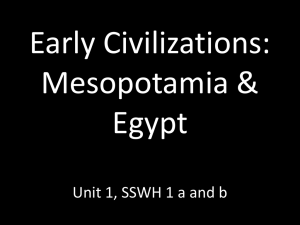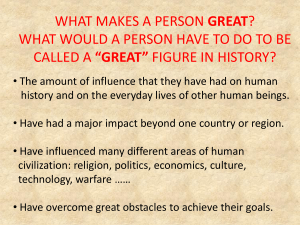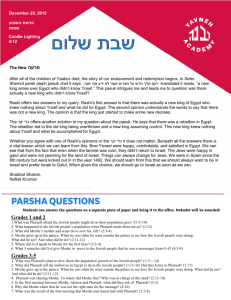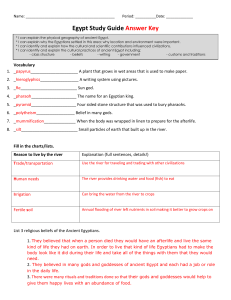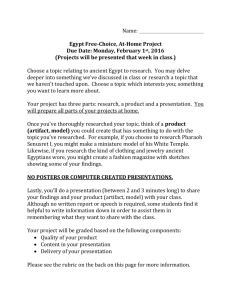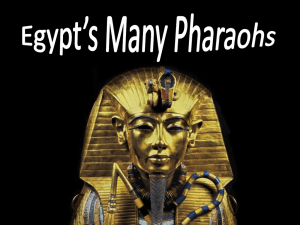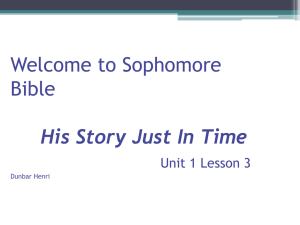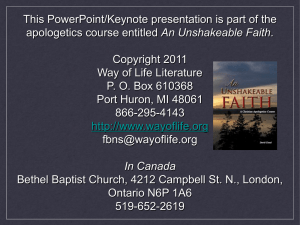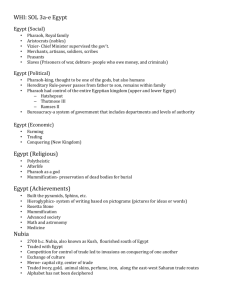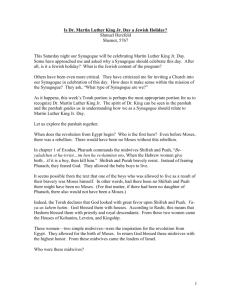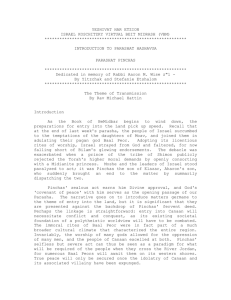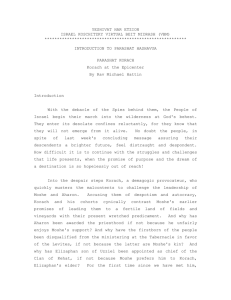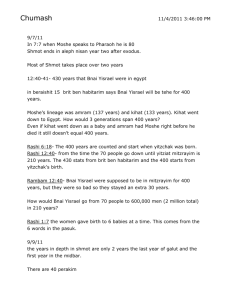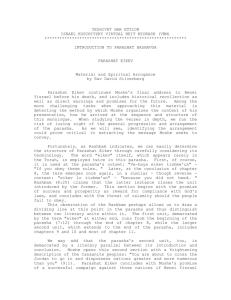Study Notes on Chapter 3 from the Gifts of the Jews
advertisement
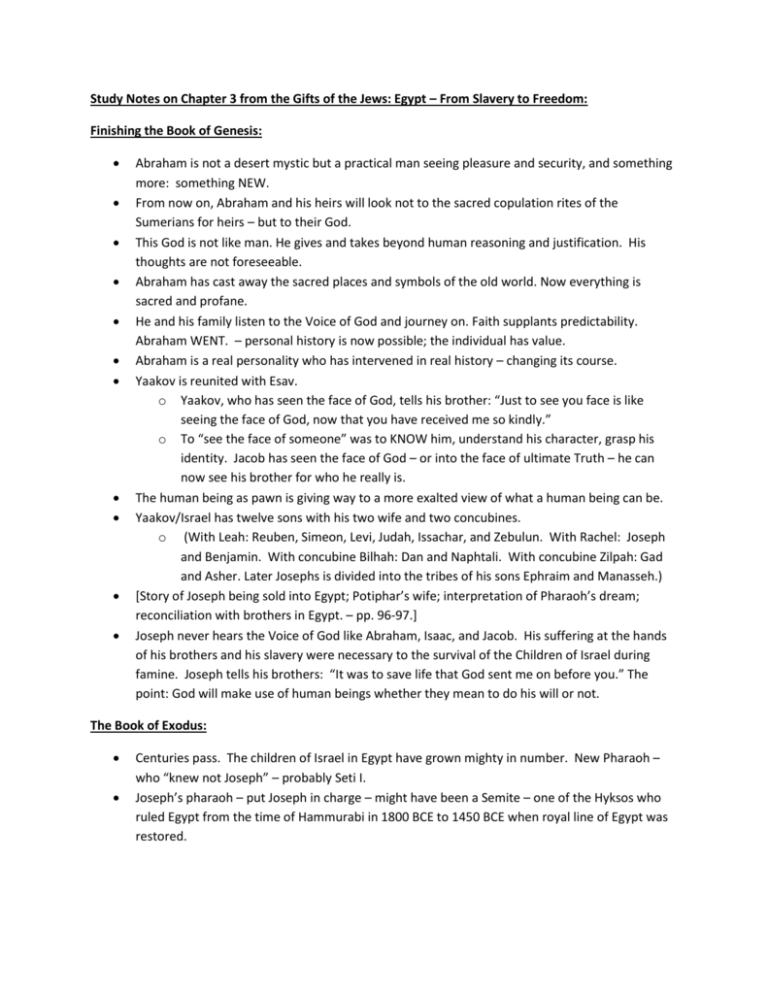
Study Notes on Chapter 3 from the Gifts of the Jews: Egypt – From Slavery to Freedom: Finishing the Book of Genesis: Abraham is not a desert mystic but a practical man seeing pleasure and security, and something more: something NEW. From now on, Abraham and his heirs will look not to the sacred copulation rites of the Sumerians for heirs – but to their God. This God is not like man. He gives and takes beyond human reasoning and justification. His thoughts are not foreseeable. Abraham has cast away the sacred places and symbols of the old world. Now everything is sacred and profane. He and his family listen to the Voice of God and journey on. Faith supplants predictability. Abraham WENT. – personal history is now possible; the individual has value. Abraham is a real personality who has intervened in real history – changing its course. Yaakov is reunited with Esav. o Yaakov, who has seen the face of God, tells his brother: “Just to see you face is like seeing the face of God, now that you have received me so kindly.” o To “see the face of someone” was to KNOW him, understand his character, grasp his identity. Jacob has seen the face of God – or into the face of ultimate Truth – he can now see his brother for who he really is. The human being as pawn is giving way to a more exalted view of what a human being can be. Yaakov/Israel has twelve sons with his two wife and two concubines. o (With Leah: Reuben, Simeon, Levi, Judah, Issachar, and Zebulun. With Rachel: Joseph and Benjamin. With concubine Bilhah: Dan and Naphtali. With concubine Zilpah: Gad and Asher. Later Josephs is divided into the tribes of his sons Ephraim and Manasseh.) [Story of Joseph being sold into Egypt; Potiphar’s wife; interpretation of Pharaoh’s dream; reconciliation with brothers in Egypt. – pp. 96-97.] Joseph never hears the Voice of God like Abraham, Isaac, and Jacob. His suffering at the hands of his brothers and his slavery were necessary to the survival of the Children of Israel during famine. Joseph tells his brothers: “It was to save life that God sent me on before you.” The point: God will make use of human beings whether they mean to do his will or not. The Book of Exodus: Centuries pass. The children of Israel in Egypt have grown mighty in number. New Pharaoh – who “knew not Joseph” – probably Seti I. Joseph’s pharaoh – put Joseph in charge – might have been a Semite – one of the Hyksos who ruled Egypt from the time of Hammurabi in 1800 BCE to 1450 BCE when royal line of Egypt was restored. Post-Hyksos pharaoh – Akhnaton decreed there was only one God (Aton the Solar Disc). Rescinded by Tutankhamon who reestablish polytheism. Seti I came to throne 34 years after Tutankhamon. Pharaoh upset by growing number of Israelites – impressed them into forced labor and ordered two midwives of the Hebrews -- Shifra and Pua -- to kill all male Hebrew children: “Look for two stones.” The midwives let the children live – we don’t know whether they were Israelites or Egyptians. o They have names (worthy) unlike Pharaoh who is nameless. Women outsmart the pharaoh: the Hebrew women don’t need midwives! Pharaoh – throw the babies in the river! [Story of Moses’s being adopted by Pharaoh’s daughter – pp. 102-103]. Moshe means “He Who Pulls Out.” Brought up as an Egyptian prince but identifies with the underdog. Kills an Egyptian beating an Israelite. Moshe flees to Midian and becomes a shepherd and is sheltered by Jethro. Moshe marries his daughter Tzippora. First son – Gershom (“Sojouner There”). Moshe: “I have been a stranger in a strange land.” Moshe’s encounter with God on Mt. Horeb – pp. 105-108. Voice out of the burning bush that is not consumed. God will send Moshe to bring the Children of Israel out of Egypt. Moshe protests. God will give him skill and strength – “I will be there with you.” Moshe is concerned about telling the Israelites: “The God of your fathers has sent me.” They will ask, what is His name? God says: YHWH – a name too sacred to speak. [Many substitute the words”Adonai” (“Lord”) and “ha-Shem” (“the Name”). ] YHWH is a VERB – an archaic form of the verb “to be.” Interpretations: “I am who I am.” “I am he who causes to be.” OR “I will be-there with you.” YHWH = the breath of life. God will send Moshe’s brother Aharon (Aaron ) to speak for him: “He shall be for you a mouth, and you, you shall be for him a god.” Moshe WENT. On the journey to Egypt, YHWH sought to make him die. Tzippora circumcises her son and touched the bloody foreskin to Moshe’s feet or legs or genitals and says, “Indeed, a bridegroom of blood are you to me!” The Covenant in blood. This means that the son’s blood from the circumcision touching Moshe confers circumcision on him. Moshe lives and has a new confidence. Meets a new pharaoh – probably Rameses II who refuses to free the Israelites. Pharaoh finds out that YHWH means—“He-Who-There-Is-No-Escaping.” [Story of the 10 plagues.] Why is Pharaoh so stubborn? In Egypt, the pharaoh was “god-on-earth, the visible manifestation of Ra, chief god of the Egyptians. o Ra’a meant “evil” in Hebrew. Ra + Moses = Rameses. Sounds to a Hebrew like “he who brings forth evil.” – the evil counterpart of Moses. o Cosmic tug-of-war between two gods: Ra and YHWH played out on earth between their designated stand-ins: Pharaoh and Moshe. o YHWH has promised Moshe, “ I will make you as a god to Pharaoh.” o Pharaoh cannot lose without causing chaos in Egypt – loss of fertility and the orderly functioning of the Nile. o Pharaoh must fail because he has not conformed his actions to God’s will. o Pharaoh – supposedly all-powerful, understands nothing. o God is on the side of the little people who have no worldly power – THE LESSON given over and over in the story of Israel. Pharaoh’s pretense to a dominion he does not own is mocked in Exodus. When a human being takes on the role of God, he must fail miserably. Children of Israel sent out richer than when they came in -- “did they strip Egypt.” They take bones of Joseph with them and head over the Sea of Reeds to avoid the Philistines. Pharaoh changes his mind and pursues. Moshe: “Do not be afraid! See YHWH’s deliverance which he will work for you today.” [Story of the parting of the Red Sea.] – “permanent victory wrestled from the very jaws of expected disaster and predictable defeat.” God is now their God – the God of Surprises – and they are HIS PEOPLE. Miryam the Prophetess, Moshe’s sister sings and dances: “Sing ye to the Lord, / for he hath triumphed gloriously; / the horse and his rider he hath flung into the sea!” This story of the deliverance is the CENTRAL EVENT of the Hebrew scriptures. Everything leads up to this moment and everything after will refer to it. The children of Israel have a growing intimacy with God that culminates in this event.
